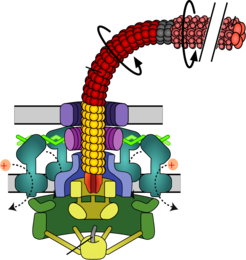Rewinding Evolution
Dr Georg Hochberg was awarded the Human Frontiers Science Grant
Max Planck Research Group Leader Georg Hochberg was awarded one of the prestigious Human Frontiers grant to study the evolution of molecular machines. The research project focuses on the flagellum, one of the marvels of cellular biochemistry: a highly efficient, self-assembling molecular machine that bacteria use to propel themselves. For evolutionary and microbiologists, it is an enduring mystery.

The bacterial flagellum is a ‘molecular machine’ that consists of many different parts that are all essential for the flagellum to work. How can gradual, Darwinian evolution build such a structure if not by inventing all necessary parts at once?
In their research project entitled “Darwin rwinDa: rewinding and rerunning evolution to study innovation in action”, Georg Hochberg collaborates with partners from the UK, France, and New Zealand to answer this question. The group will study how a particular group of bacteria evolved an unusually powerful flagellum and in the process acquired many new motor components.
‘Our ambition is to create a visually detailed history of how this machine evolved step-by-step, similar to how we can follow the evolution of the vertebrate eye or limb through their different evolutionary stages in the fossil record’, says Georg Hochberg. Except that in this case the researchers are facing the enormous challenge that there are no fossils of this incredibly tiny machine.
Instead, the team will hunt for clues of how it evolved in the genomes of different microorganisms alive today. They then plan to image the flagellum directly inside cells of bacteria that preserve different stages of its evolution. The team will also go out and hunt for bacteria that contain ‘living fossils’ of the flagellum in far out of the way places, like black smokers at the bottom of the ocean. This, the team hopes, will finally reveal how evolution created this famously complex molecular machine.
The members of the team are: Georg Hochberg (MPI Marburg), Morgan Beeby (Imperial College London), Francesco Pedaci (CNRS Montpellier) and Craig Cary (University of Waikato). The cooperation team`s application went through a rigorous year-long selection process in a global competition that started with 709 submitted letters of intent involving scientists with their laboratories in more than 50 different countries. This year, 7 Research Grants -Early Career and 21Research Grants -Program were selected for funding. HFSP’s collaborative research grants are given for a broad range of projects under the umbrella theme “Complex mechanisms of living organisms”. The Program funds cutting-edge, risky projects and it is the only program that supports international teams of scientists with laboratories in different countries. HFSP Program Grants appeal to the innovative and creative potential of the research teams.
The Human Frontier Science Program is an international program of research support implemented by the International Human Frontier Science Program Organization (HFSPO) based in Strasbourg, France. Its aims are to promote intercontinental collaboration and training in cutting-edge, interdisciplinary research focused on the life sciences. HFSPO receives financial support from the governments or research councils of Australia, Canada, France, Germany, India, Israel, Italy, Japan, Republic of Korea, New Zealand, Singapore, Switzerland, UK, USA, as well as from the European Union.












